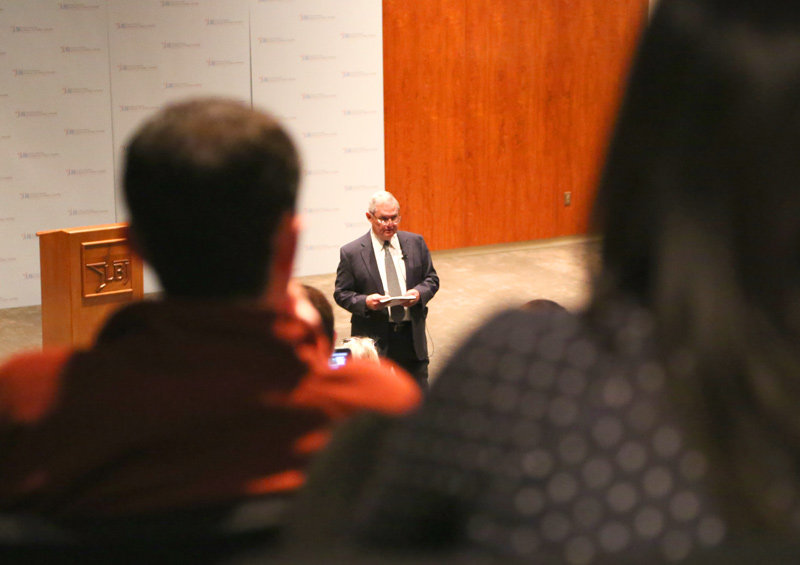Dean Robert Hutchings met with a group of LBJ School students and faculty on Monday to discuss his vision for how the school can develop and grow over the coming years.
Hutchings highlighted several main areas he has focused on during his time as dean:
- Washington, DC Campus. When Hutchings arrived at the LBJ School, the student body was growing – yet the number of students interning in Washington, DC was declining. With the introduction of a Washington, DC summer program, the LBJ School has reversed that decline, with record numbers of students interning and studying in DC the last two years. The dean believes the next step is to “bring LBJ back to Washington” by both creating an LBJ School campus in downtown Washington and establishing a Washington-specific track within the existing Public Affairs and Global Policy Studies programs. This track will allow students in it to spend their first year in Austin and then spend their subsequent summer and fall semesters at the nation’s capitol, where they will both intern and take academic courses before graduating in December. The LBJ School anticipates taking applications for this track for Fall 2015, pending approval by the University of Texas’ president and provost.
- Executive Masters Program. As an assistant dean at Princeton’s Woodrow Wilson School, Hutchings established that school’s mid-career program. Now, the administration has brought an Executive Masters Program to the LBJ School, with the first cohort due to start this May for a 15-month program aimed at mid-career professionals. Hutchings described the program as targeting rising policy makers, strengthening the school’s image and brand and providing a new revenue source at a time when state funding as a percentage of the school’s total funding is declining.
- International Partnerships. When Hutchings arrived, the LBJ School had no institutionalized international partnerships. Today, it has six such partnerships around the world, in the Middle East, East Asia, Mexico and Germany. Although the dean foresees additional partnerships in the future, he believes the immediate priority is to consolidate and expand those the school has already established. The dean’s office has encouraged students to consider applying for one of these exchanges before next week’s deadline.
- LBJ School Finances. LBJ School funding comes from three major sources: core funding from the state (about 30 percent), endowments (about 30 percent) and sponsored research (about 30 percent). The remainder comes from self-generated funds (the Executive Masters program will fall into this category). Traditional funding sources, such as state funding and tuition, are unlikely to increase in the near future. Indeed, state funding has actually been shrinking as a percentage of overall budget. This, together with a requirement to self-fund annual merit pay raises for faculty and staff, means that the university faces a difficult financial situation. Hutchings said the administration is working hard to build up the school’s fundraising efforts and that all of the school’s new initiatives, including the international partnerships and the Washington, DC campus, must be self-financing. The school’s challenge is to continue innovating and improving without new revenue from the state or from increasing tuition.
- Development. Hutchings described the LBJ School’s renewed focus on development and fundraising efforts. When the dean arrived at the LBJ School, the institutional roles overseeing development were largely unfilled. Now, however, the LBJ School has a Director of Development and an active Advisory Council, which includes former Sen. Kay Bailey Hutchison, former Lt. Gov. Ben Barnes, and State Sen. Rodney Ellis, among others. The school has also prioritized expanding student fellowship support. To help accomplish this, the dean has decided to dedicate money raised from alumni donations entirely to student fellowship support. Hutchings also said that the school is trying to increase the endowments for its research centers in order to support important policy research and continue to provide students with the opportunity to work as research assistants.
- Alumni Outreach. Hutchings said that the LBJ School has made significant strides in alumni outreach over the past several years and is continuing to work to strengthen the school’s bonds with its former students. He noted that the LBJ School has risen in the University of Texas at Austin’s school-by-school rankings of annual alumni donating as a percentage of total alumni. The school has climbed in rankings from near the bottom several years ago to first place this year.
- Diversity. Hutchings said that he believes that diversity is essential for a policy school’s success. This includes diversity of thought, background, experience and personal identity, in addition to diversity of race and ethnicity. To this end, the administration has worked with students on an action plan to increase the school’s diversity. “We have to look like the constituencies we hope to represent,” Hutchings said.
- Rankings. Hutchings recognized that though he believes policy school rankings – such as those that the U.S. News and World Report publishes – are subjective indicators of school reputation rather than measures of actual school quality, he nevertheless takes such rankings seriously. As a result, Hutchings said the administration is working to be very visible within the policy school network and to make a good impression at every possible opportunity. He highlighted that the LBJ School hosted the Network of Schools of Public Policy, Affairs, and Administration (NASPAA) in 2013, as an example of this strategy. Additionally, several faculty members have also risen to top leadership positions in such influential associations as the Association for Public Policy Analysis and Management (APPAM), the Association for Research on Nonprofit Organizations and Voluntary Action (ARNOVA) and the Association of Professional Schools of International Affairs (APSIA).

